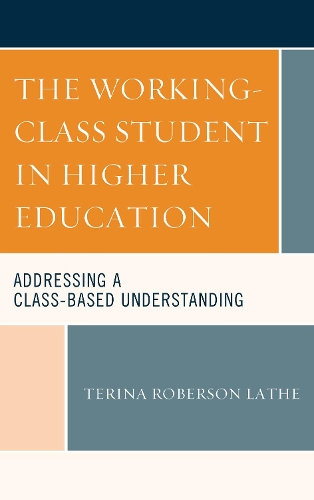
The Working-Class Student in Higher Education: Addressing a Class-Based Understanding
(Hardback)
Publishing Details
The Working-Class Student in Higher Education: Addressing a Class-Based Understanding
By (Author) Terina Roberson Lathe
Bloomsbury Publishing PLC
Lexington Books
8th November 2017
United States
Classifications
Professional and Scholarly
Non Fiction
Higher education, tertiary education
Social classes
Social discrimination and social justice
378.1982624
Physical Properties
Hardback
132
Width 160mm, Height 237mm, Spine 15mm
331g
Description
The Working-Class Student in Higher Education: Addressing a Class-Based Understanding challenges understandings of social class and education by asking how community college faculty perceive working-class students and how that perception reflects class-based assumptions in higher education. Faculty may recognize social class, but how it is experienced within higher education is often lost in translation, particularly when faculty members are interacting with a differently classed student population. Recommended for scholars of education, pedagogy, and sociology.
Reviews
For the past 25 years, scholars have focused discussions of social class in higher education on the experiences of working-class academics and the needs of working-class students. The Working-Class Student in Higher Education offers an important shift in focus, examining how cultural assumptions about class shape the way facultyespecially the community college faculty who teach the majority of undergraduates from the working classview and treat their students. -- Sherry Linkon, Georgetown University
This is a well-referenced examination of an important topic that concludes with a list of workable recommendations for increasing completion rates among working class students attending community colleges. Four-year colleges should adopt these proposed reforms as well. If successfully implemented, the suggested changes would raise social class awareness among students, faculty, and administrators throughout higher education, a long overdue and laudable objective. -- Kenneth W. Oldfield, University of Illinois, Springfield
Terina Lathes new book will be an important addition to the growing library of working class studies. In particular, she addresses the insights and struggles of students and faculty from community colleges, the social location that so many working-class people pass through on their trek into the unknown and unexpected cultural terrain of the professional middle class. She deftly describes the challenges both students and faculty face, in all of higher education, that are often invisible on both sides. Further, she gives us a thorough and thoughtful treatment of differing approaches to defining class in America. She is both personal and professional, she is steeped in the literatureproviding an excellent review of it, and she also has her own perspective to add to the field. I strongly recommend this book. -- Barbara Jensen, University of Minnesota
Author Bio
Terina Roberson Lathe is professor of sociology at Central Piedmont Community College.
